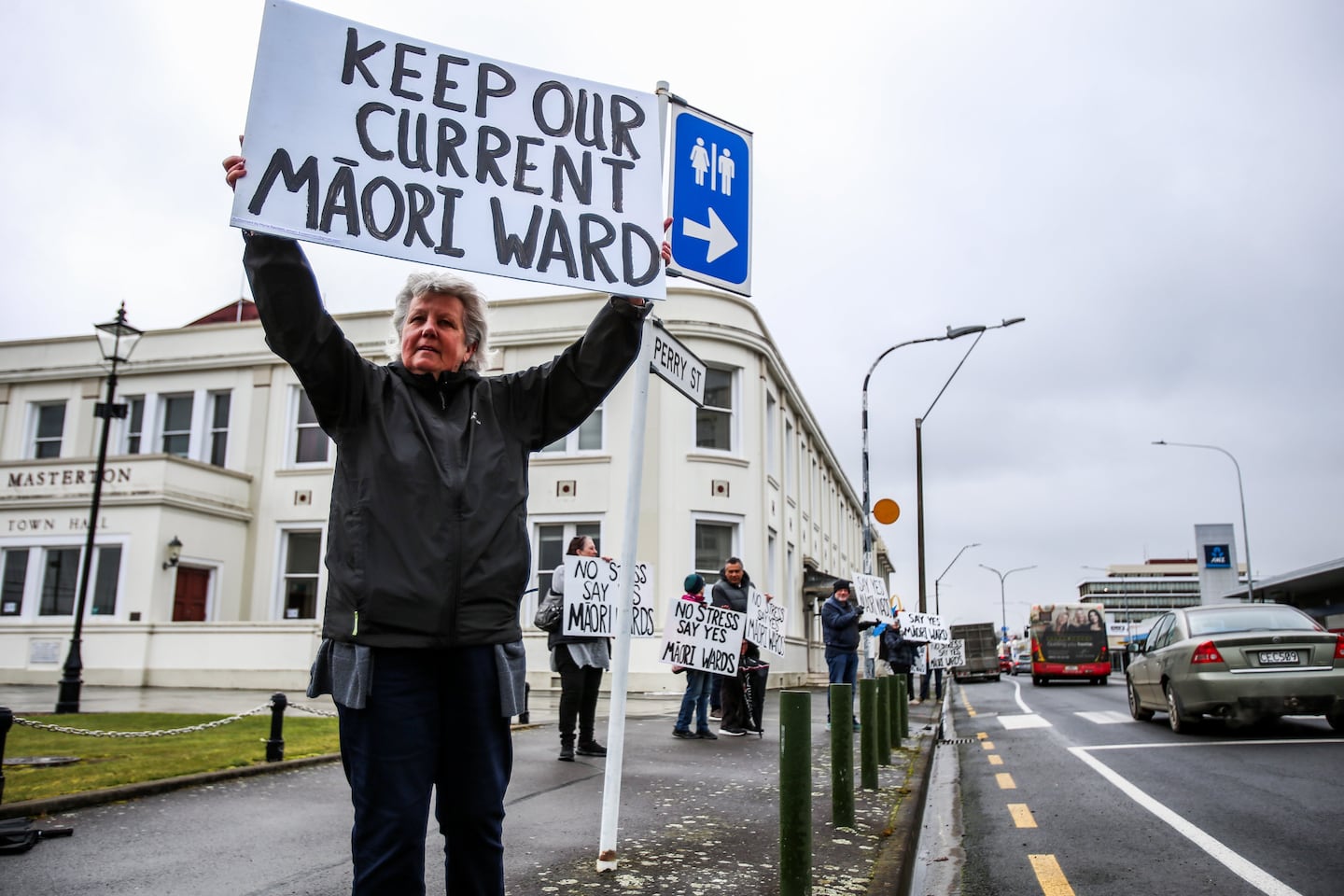“Give us a toot mate!” Masterton’s former mayor Lyn Patterson called out from the roadside on Friday.
Enthusiastic honks and toots followed as she held a sign high above her head that read: “Keep our current Māori ward”.
Patterson was one of a modest but vocal contingent of demonstrators campaigning at Masterton’s Town Square in favour of keeping the ward ahead of a government-mandated binding poll that would run alongside local body elections this year.
In it, residents would be asked whether to keep or remove the ward for the 2028 and 2031 elections.
Patterson was Masterton’s mayor when her council voted in 2021 to establish its Māori ward.
Councillor Marama Tuuta had been elected unopposed in 2022 and “the sun still rose in the morning and set at night,” Patterson said.
“It’s too important for us to lose. My view is, come on Masterton, stand up and show New Zealand that 22% of our population deserve a voice around the table.”
In 2021, the then Labour Government removed the requirement for binding polls for Māori wards and more than 40 councils established a Māori ward as a result.
Last year, the Coalition Government restored the pre-2021 policy settings, requiring a simple majority vote to bind the council on Māori wards for two local government terms.
It also required councils with Māori wards established after March 2021 to hold a referendum alongside the 2025 election.
Carterton mayoral candidate Simon Casey, who ran as the ACT Party candidate for Wairarapa in 2023, said significant changes to the makeup of councils should be put first to the community.
“We recently put the merging of water services to a poll and received a clear majority in support which gave council a mandate,” he said.
“The same must apply with Māori wards and any other special ward.
“The main benefit is that we know the community is either behind it or not so we have their mandate.”
He was personally not in favour of Māori wards and believed it was “very condescending saying that Māori need a special ward to be elected”.
“We have a growing number of Māori being elected outside of Māori wards,” he said, citing mayors Tori Whanau and Tania Tapsell.
“I definitely want to see Iwi representation as they are major players in our community. But we don’t need special wards to achieve that.”

Waireka Collings, who was running for Masterton’s mayoralty and the Māori ward, took part in Friday’s demonstration.
“It’s very important for our people to be sitting at the table,” she said.
Having a vote at the council table reaffirmed for Māori “the special place they hold here in this land”.
She said the law was inconsistent and unfair because establishing wards for other communities of interest, such as rural, did not require a referendum.
“We exist in the country together and yet we are second-rate citizens in our own country and our whenua.
“If you want people to have a fair go in this country, then voting to keep Māori wards is something you can do as an individual.”
The number of demonstrators was bolstered by aspiring Masterton council candidates Chris Peterson, Andrea ‘AJ’ Jackson, Henriette Nagel, and Hayden Mischefski.
Tuuta, who was running for re-election as Masterton’s Māori ward councillor, was unable to attend and gave her apologies.
Peterson, who had decades of experience on Masterton’s council, said the addition of a Māori ward was “constructive and beneficial”.
“Way back 25 years ago or whenever I started, the council was terribly uniform and from one demographic in the community.
“Our society is far more diverse now and we need to reflect that in the decisionmaking chamber.”
A New Zealand Taxpayer Union (NZTPU) poll last year showed that a majority of respondents believed the decision on Māori Wards should be made by local voters via a referendum.
“While councils can make the case for why a ward is needed, it shouldn’t be imposed without a mandate from the public,” an NZTPU spokesperson said.
“A community-led approach builds trust and legitimacy.”
The spokesperson said the NZTPU did not take a position for or against Māori wards - “our focus is on the process”.
“This is about respecting local democracy. Whether a Māori ward is the right choice for a community should be decided by the people who live there, not a small group around a council table.”
A binding poll would be run in Masterton and South Wairarapa.
Neighbouring Carterton does not have a Māori ward.
South Wairarapa Mayor Martin Connelly, who attended the demonstration on Friday, said Masterton had “shown the benefit” of a Māori ward.
“We hope to show a similar benefit when we elect our first Māori ward councillor this year.”
-LDR is local body journalism co-funded by RNZ and NZ On Air




